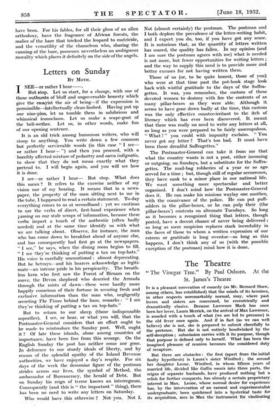Letters on Sunday
BY MOTH.
T SEE—or rather I hear .
-I- But stop. Let us start, for a change, with one of those outbursts of bluff and ungovernable honesty which give the essayist the air of being—if the expression is permissible--intellectually clean-limbed. Having put up our nine-pins, let us tumble them in salubrious and whimsical iconoclasm. Let us make a scape-goat of the bell-wether. Let us, in other words, make fun of our opening sentence.
It is an old trick among humorous writers, who will stoop to anything. You write down a few common but perfectly serviceable words (in this case " I see— or rather I hear— ") and then you proceed, with a horribly affected mixture of pedantry and saeva indignalio, to show that they do not mean exactly what they pretend to. I will begin again, and you will see how it is done.
I see—or rather I hear— But stop. What does this mean ? It refers to the exercise neither of my vision nor of my hearing. It means that in a news- paper, the property of the man sitting next to me in the tube, I happened to read a certain statement. To-day everything comes to us at secondhand ; yet we continue to use the verbs of direct, first-hand experience when passing on our stale scraps of information, because these verbs impart a touch of the authentic (often badly needed) and at the same time identify us with what we are talking about. Observe, for instance, the man who has come down to breakfast ahead of anyone else, and has consequently had first go at the newspapers. " I see," he says, when the dining room begins to fill, " I see they're thinking of putting a tax on top-hats." His voice is carefully unemotional : almost deprecating. But he betrays—and his hearers acknowledge as legiti- mate—an intense pride in his perspicacity. The breath- less kern who first saw the Forest of Birnam on the move, the Devon shepherd who descried the Armada through the mists of dawn—these were hardly more happily conscious of their fortune in securing fresh and exclusive information than the man who, negligently secreting The Times behind the ham, remarks : " I see they're thinking of putting a tax on top-hats."
But to return to our sheep (those indispensable soporifics). I see, or hear, or what you will, that the Postmaster-General considers that an effort ought to be made to reintroduce the Sunday post. Well, ought it ? Of late these islands, alone among countries of importance, have been free from this scourge. On the English Sunday the post has neither come nor gone. In deference to our sturdy ideals of liberty, 'and by reason of the splendid apathy of the Inland Revenue authorities, we have enjoyed a day's respite. For six days of the week the demoniac figure of the postman strides across our lives, the symbol of Method, the ambassador of Bureaucracy, the herald of Debt. But on Sunday his reign of terror knows an interregnum. Consequently (and this is " the important " thing), there has been no need to write any letters on Saturday.
Who would have this otherwise ? Not you. Not I. Not (almost certainly) the postman. The postman and I both deplore the prevalence of the letter-writing habit, and I expect you do, too, if you have got any sense. It is notorious that, as the quantity of letters written has soared, the quality has fallen. In my opinion (and I am sure the postman agrees with me) what is needed is not more, but fewer opportunities for writing letters ; and the way to supply this need is to provide more and better excuses for not having written them.
Those of us (or, to be quite honest, those of you) who were at that time past the pot-hook stage look back with wistful gratitude to the days of the Suffra- gettes. It was, you remember, the custom of these devoted women to destroy with fire the contents of as many pillar-boxes as they were able. Although it seems to have gone down badly at the time, this custom was the only effective counter-irritant to the itch of literacy which has ever been discovered. It meant that there was really no need to write any letters at all, as long as you were prepared to be fairly unscrupulous. " What ! " you could with impunity exclaim. " You never got my letter ? That's too bad. It must have been those dreadful Suffragettes."
The Postmaster-General can take it from me that what the country wants is not a post, either incoming or outgoing, on Sundays, but a substitute for the Suffra- gettes. The mail-bag robberies of a year or so ago served for a time ; but, though still of regular occurrence, they have sunk to a minor place in our national life. We want something more spectacular and better organized. I don't mind how the Postmaster-General does it. He can make his minions waylay one another, with the connivance of the police. He can put puff- adders in the pillar-boxes, or he, can pulp their (the pillar-boxes') contents on alternate Tuesdays. So long as it becomes a recognized thing that letters, though posted, have a decent chance of never being delivered ; so long as mere suspicion replaces stark incredulity in the faces of those to whom a written expression of our esteem or gratitude is long overdue—so long as this happens, I don't think any of us (with the possible exception of the postman) mind how it is done.








































 Previous page
Previous page